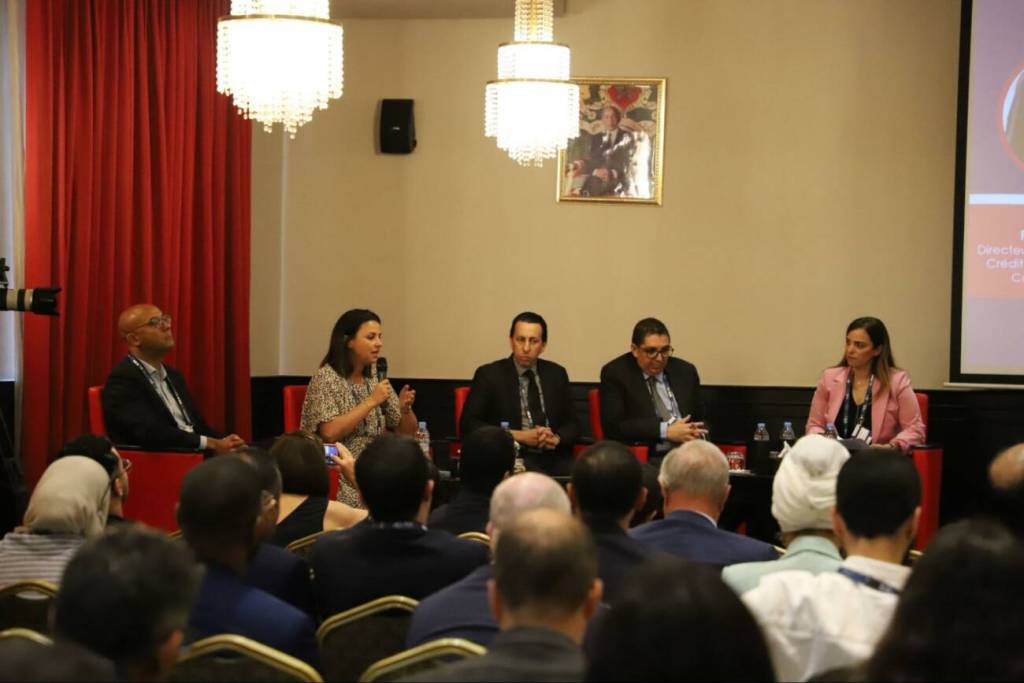Digitalisation in Morocco: strategies, challenges, and future vision

The digital revolution in Morocco has been a topic of intense focus and development over the past two decades.
As a country with a rich history and a strategic position in international trade, Morocco has been steadily advancing its digital infrastructure to streamline and enhance various sectors of its economy and propel the country into a new era of economic growth and global competitiveness.
Strategic initiatives and collaborations are at the heart of these efforts to foster a robust digital ecosystem encompassing everything from administrative procedures to foreign trade operations.
At the EBRD’s Conference on the Digitalisation of International Trade in Morocco, Farah Lahbib, Director, Credit Management and Trade Finance Group at OCP, spoke with
- Youssef Ahouzi, CEO of PortNet;
- Rhita Benotmane, Director of the Digital Development Agency;
- Adil Lahbichi, Executive Director, Global Transaction Banking at the Bank of Africa;
- Hicham Amadi, Vice President, Digital Economy at Asmex.
Development and implementation of digital strategies in Morocco
Morocco’s journey towards digitalisation began with recognising the internet’s transformative potential. The government’s commitment to leveraging digital tools for economic development has been evident through a series of strategic programmes and initiatives, including E-Morocco 2010, Morocco Numerik 2013, and Morocco Digital 2020.
In 2024, ICC Morocco established a task force, DigiTradeMorocco, to help promote the ongoing efforts to digitalise trade.
These programmes aim to gradually build a structured digital ecosystem supporting the nation’s economic ambitions. The Moroccan Digital Development Agency (ADD) has played a pivotal role in these efforts, driving digital transformation across various sectors.

Lahbichi said, “As of today, 60% of the banking transactions in Morocco are digitised. We are waiting for this digital transformation of our local and international trade to help us finance the economy.”
The agency has focused on simplifying administrative procedures and digitising over 600 administrative services catering to businesses, citizens, and intra-administration interactions. Developing a national interoperability platform based on application programming interface (API) technology has further enhanced information exchange between different government bodies.
Amadi said, “The first thing they did is to remove some procedures and not digitise them because they realised those procedures were useless. That was the first step.”
In addition to the technology-backed strategies, the Moroccan government has been working to establish a legal framework to support digitalisation. Laws on cybersecurity, data privacy, and the simplification of administrative procedures—legal measures critical to fostering trust and encouraging the adoption of digital tools among businesses and citizens—now exist in the country.
Portnet and the digitalisation of foreign trade
A significant milestone in Morocco’s digital journey has been the establishment of Portnet, a national single window for foreign trade.
This system has revolutionised trade operations, offering a unified platform for connecting stakeholders, including port authorities, customs, shipping agents, and freight forwarders.
Initially implemented in the Port of Casablanca, Portnet has since been expanded to cover all Moroccan ports, integrating the entire international trade community and dramatically streaming the documentation process for imports and exports.
Ahouzi said, “Now in 2024, we have around 50,000 to 60,000 businesses that are on the platform. They range from foreign traders, shipping agents, freight forwarders, all sorts of actors.”
Previously, obtaining the necessary approvals and licenses for foreign trade could take weeks and require multiple copies of documents. Digitalising these processes has reduced this to mere hours, lowering the time and cost of trade operations and allowing Moroccan businesses to be more competitive on a global scale.
Ahouzi said, “We can be proud to have processes that are 100% digitised. For example, in the harbour of Casablanca, there is no need to file or deposit the physical documents at the harbour master’s office for the docking of a ship. No physical documents are circulating.”
This system has manifold benefits: it reduces unnecessary travel and administrative overheads, provides real-time access to key performance indicators, and enhances transparency across the board.
Portnet’s success is also a testament to the importance of collaboration among different stakeholders. The platform has created an ecosystem supporting the efficient flow of goods and information by bringing together public and private sector entities to overcome the traditional bureaucratic hurdles that often hamper trade activities.
Challenges in adopting digital technologies
Despite the progress, Morocco’s path to full digitalisation has come with challenges, one of which is cultural resistance to change.
Benotmane said, “Some people are afraid of change. People are afraid of acquiring the new method, it can be a cultural origin.”
Many individuals and organisations hesitate to adopt new technologies due to a lack of familiarity and a fear of the unknown. This resistance is often compounded by a deficiency in digital skills, which limits the ability of businesses and public sector entities to fully leverage digital tools.
Security concerns also pose a major challenge. Data security and privacy become paramount as digital systems become more integrated into critical operations and organisations are understandably cautious about trusting sensitive information to digital platforms, particularly when it involves third-party providers and cloud-based services.
Cost is another challenge. Implementing advanced digital systems requires significant investment, which can be a barrier for smaller businesses and even some public sector entities. Securing the necessary funding and demonstrating the return on investment is critical to advancing digital initiatives.
Benotmane said, “There is no single magic solution that we can all adopt, but it is a case-by-case basis. We need to give a sense and assess the technology that we want to use, and we have to put in the front of it the good mechanisms to be used in a correct and suitable manner for all.”
Future vision and collaboration
Morocco’s vision for digitalisation is ambitious and forward-thinking, aiming to achieve 100% digitalisation of its processes by 2030. This vision is not merely about adopting new technologies but about fundamentally transforming the way the Moroccan economy operates.
Achieving this goal will require sustained efforts in several key areas.
First, there must be a continued focus on enhancing digital skills across the population. Training programmes and educational initiatives to equip the workforce with the competencies needed to thrive in a digital economy will help foster a national mindset that embraces innovation and the opportunities presented by digital tools.
Second, collaboration between the public and private sectors must be strengthened. The success of platforms like Portnet demonstrates the power of cooperative efforts to drive digital transformation. By working together, government bodies, businesses, and other stakeholders can develop integrated solutions that address the needs of the entire ecosystem. This will help encourage digital entrepreneurship and the development of new technologies that will be key to sustaining Morocco’s digital momentum.
Finally, there must be a concerted effort to ensure that the legal and regulatory framework keeps pace with technological advancements. Laws governing digital transactions, data protection, and cybersecurity must be continually updated to reflect the evolving digital landscape. This will help to build trust and confidence among users, ensuring that digital tools are used safely and effectively.
Benotmane said, “We have to remain proactive in the face of the different technologies. Of course, sometimes it is technologies that are disruptive, but it is important to make the most of those and benefit from the whole package by focusing on the essential part that is useful to us while respecting all the laws.”





